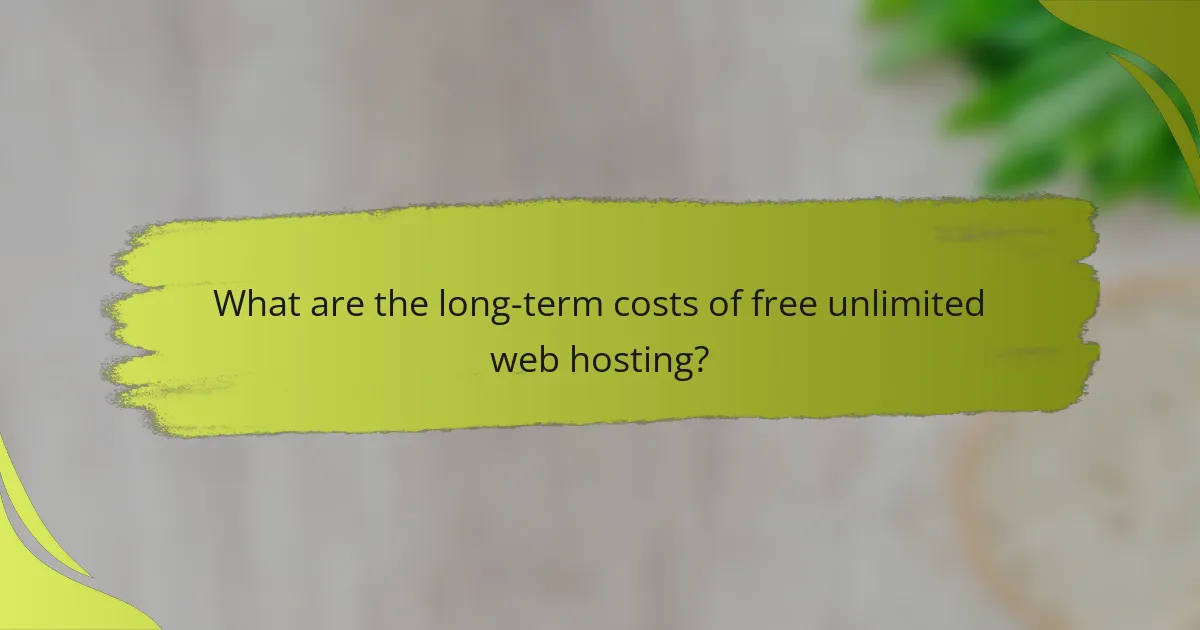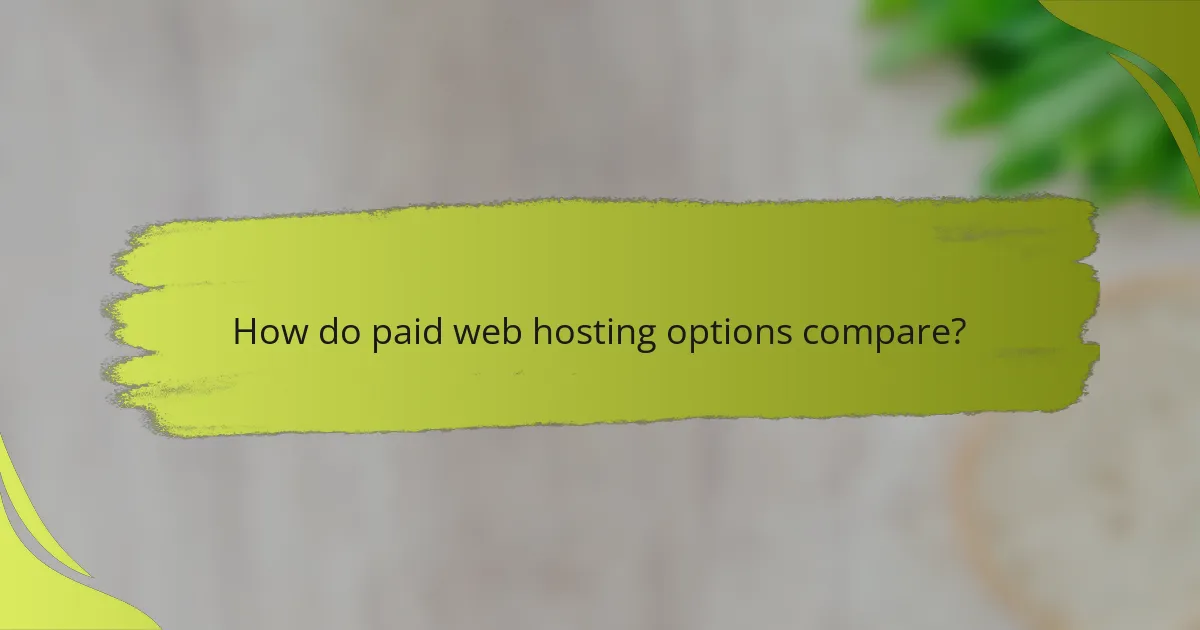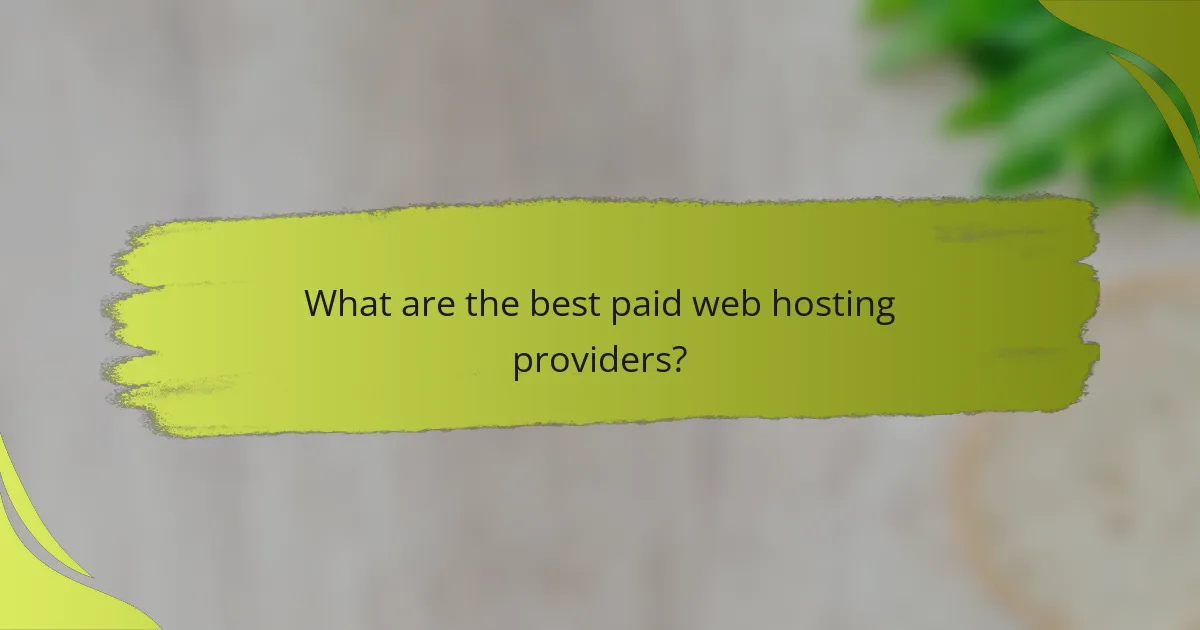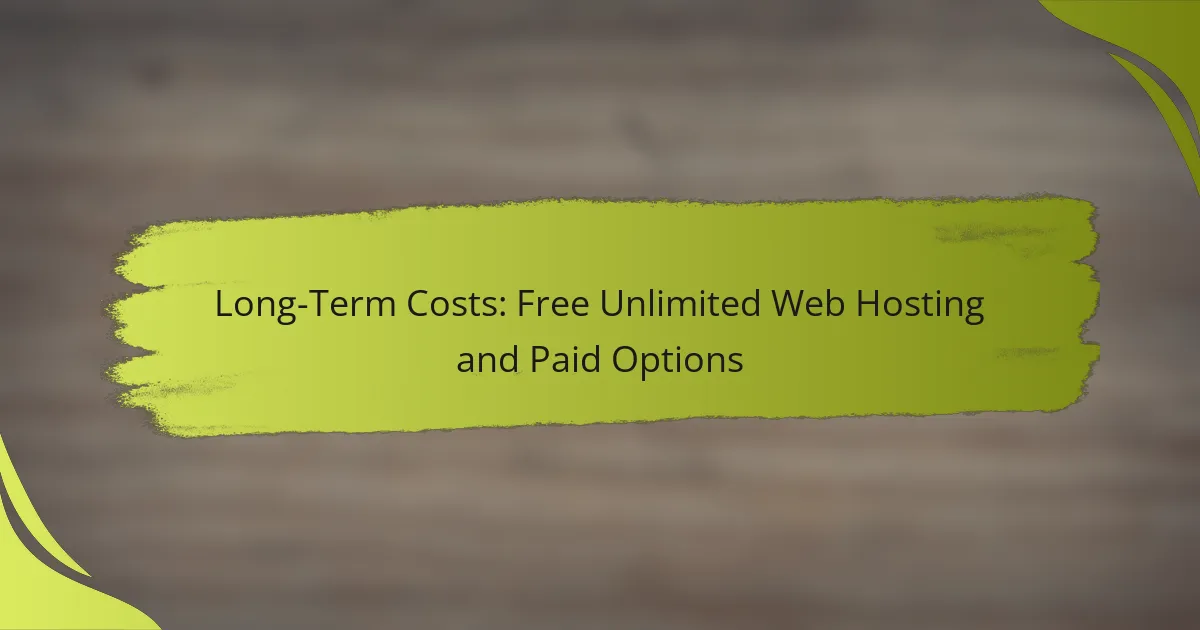When considering web hosting options, the long-term costs of free unlimited services can outweigh their initial appeal due to limited features and potential hidden fees. While free hosting may seem attractive, it often leads to performance issues and security risks that can hinder your website’s growth. In contrast, paid hosting providers offer enhanced reliability, support, and features, making them a more sustainable choice for serious website owners.

What are the long-term costs of free unlimited web hosting?
The long-term costs of free unlimited web hosting often manifest through limited features, potential hidden fees, and risks to site performance. While the initial price seems appealing, these factors can lead to significant expenses and challenges over time.
Limited features and performance
Free unlimited web hosting typically comes with restricted features that can hinder your website’s growth. Users may find limitations on storage, bandwidth, and the types of applications they can run. This can result in slower load times and a less professional appearance.
For example, many free hosting services do not support custom domains or advanced security features, which can be crucial for businesses looking to establish credibility online. As your site grows, you may need to invest in a paid plan to access essential functionalities.
Potential for hidden fees
While advertised as free, many unlimited web hosting services include hidden fees that can accumulate over time. These may include charges for domain registration, email accounts, or additional storage. Users often overlook these costs until they receive unexpected bills.
It’s advisable to read the fine print and understand the full pricing structure before committing. Some providers may also impose fees for exceeding bandwidth limits, which can lead to sudden expenses if your website experiences increased traffic.
Impact on SEO and site speed
Free unlimited web hosting can negatively affect your website’s SEO and speed. Many free hosts place ads on your site, which can detract from user experience and lower search engine rankings. Additionally, slower loading times can lead to higher bounce rates, further harming your SEO efforts.
To maintain good SEO practices, consider investing in a reliable hosting service that offers optimized performance. A paid option typically provides better uptime and faster load speeds, which are critical for attracting and retaining visitors.
Risk of data loss and downtime
Using free unlimited web hosting carries a higher risk of data loss and downtime. Many free services do not offer regular backups or robust security measures, making your site vulnerable to crashes or data breaches. This can result in lost content and revenue.
To mitigate these risks, consider implementing your own backup solutions or transitioning to a paid hosting plan that includes automatic backups and enhanced security features. This investment can save you from potential headaches in the future.
Customer support limitations
Customer support for free unlimited web hosting is often minimal or non-existent. Users may struggle to find assistance when issues arise, leading to prolonged downtime and frustration. This lack of support can be detrimental, especially for businesses that rely on their online presence.
When choosing a hosting provider, prioritize those that offer reliable customer support, including live chat or phone options. Investing in a paid hosting service can ensure you receive timely help when needed, allowing you to focus on growing your website rather than troubleshooting technical issues.

How do paid web hosting options compare?
Paid web hosting options typically offer enhanced performance, reliability, and support compared to free unlimited hosting. While free services may seem appealing, they often come with limitations that can hinder your website’s growth and security.
Enhanced features and resources
Paid web hosting plans generally provide a range of enhanced features that are crucial for a professional online presence. These may include increased storage space, higher bandwidth limits, and access to advanced tools like website builders and content management systems.
For example, while free hosting might limit you to a few gigabytes of storage, paid options often start with tens of gigabytes and can go up to unlimited storage, allowing for more extensive content and media hosting.
Better customer support
One of the significant advantages of paid web hosting is access to reliable customer support. Most paid services offer 24/7 support through various channels, including live chat, email, and phone, ensuring that help is available whenever you need it.
In contrast, free hosting providers may offer limited or no support, leaving you to troubleshoot issues on your own. This can lead to extended downtime and lost opportunities if your website encounters technical problems.
Improved security measures
Paid web hosting options typically include enhanced security features that are essential for protecting your website and its data. These may consist of SSL certificates, regular backups, and advanced firewalls to safeguard against cyber threats.
Free hosting services often lack these critical security measures, making your site more vulnerable to attacks. Investing in paid hosting can significantly reduce the risk of data breaches and ensure compliance with privacy regulations.
Scalability for growing businesses
Paid web hosting plans are designed to accommodate growth, offering scalable solutions that can adapt to your business’s changing needs. As your website traffic increases, you can easily upgrade your plan to access more resources without significant downtime.
In contrast, free hosting services may restrict your ability to scale, forcing you to migrate to a different provider as your business expands. Choosing a paid option from the start can save you time and hassle in the long run.

What are the best paid web hosting providers?
The best paid web hosting providers offer reliable performance, excellent customer support, and a range of features tailored to different needs. Key players in the market include Bluehost, SiteGround, and HostGator, each with unique offerings that cater to various budgets and requirements.
Bluehost pricing and features
Bluehost is known for its competitive pricing, starting at around $2.95 per month for basic plans. These plans typically include a free domain for the first year, SSL certificate, and 24/7 customer support, making it a solid choice for beginners.
Features such as one-click WordPress installation and a user-friendly control panel enhance the overall experience. However, renewal rates can increase significantly, so it’s wise to check the long-term costs before committing.
SiteGround performance and support
SiteGround is recognized for its exceptional performance and customer support, with plans starting at approximately $3.99 per month. They offer features like daily backups, free CDN, and enhanced security, which are particularly beneficial for websites with high traffic.
Their support team is available via live chat and phone, often receiving high marks for responsiveness. While SiteGround’s pricing may be higher than some competitors, the quality of service justifies the investment for many users.
HostGator plans and scalability
HostGator offers a range of plans starting around $2.75 per month, making it an affordable option for those looking to scale. Their shared hosting plans come with unmetered bandwidth and a free website builder, appealing to both beginners and more experienced users.
As your website grows, HostGator provides easy upgrades to VPS or dedicated hosting, ensuring that your site can handle increased traffic without significant downtime. However, be mindful of potential upselling during the signup process, which can increase initial costs.

How to choose between free and paid hosting?
Choosing between free and paid hosting depends on your specific needs and future plans. Free hosting may be suitable for personal projects or small websites, while paid options typically offer better performance, support, and scalability for businesses.
Assessing business needs
Start by identifying the primary purpose of your website. If you require custom domain names, higher bandwidth, or specific software, paid hosting is often necessary. Free hosting usually comes with limitations that can hinder professional growth.
Consider the expected traffic to your site. For businesses anticipating significant visitor numbers, paid hosting provides the reliability and speed needed to maintain a positive user experience.
Evaluating long-term goals
Your long-term goals should influence your hosting choice. If you plan to expand your website or add features like e-commerce, a paid hosting plan is more suitable. These plans often include essential tools and resources for growth.
Think about your brand image. A professional hosting service can enhance credibility, while free hosting may convey a less serious approach to potential customers.
Considering budget and resources
Evaluate your budget for web hosting. Free options may save money initially, but hidden costs can arise, such as limited support or the need for upgrades. Paid hosting typically ranges from a few dollars to several hundred per month, depending on features.
Assess your technical skills and available resources. If you lack the expertise to manage a website effectively, investing in a paid service with customer support can save time and frustration in the long run.

What are the prerequisites for selecting a web host?
Selecting a web host requires understanding your website’s needs, budget, and the features offered by hosting providers. Key considerations include bandwidth, storage, scalability, and customer support.
Assessing Your Website Needs
Begin by evaluating the type of website you plan to host, whether it’s a personal blog, an e-commerce site, or a business portfolio. Each type has different requirements for performance, security, and resources. For instance, e-commerce sites typically need robust security features and higher bandwidth to handle transactions.
Consider the expected traffic volume as well. If you anticipate high visitor numbers, opt for a host that offers scalable solutions to accommodate growth without compromising performance.
Understanding Hosting Types
Familiarize yourself with the different types of hosting available: shared, VPS, dedicated, and cloud hosting. Shared hosting is cost-effective but may limit performance due to resource sharing. VPS offers more control and resources, while dedicated hosting provides maximum performance at a higher cost.
Cloud hosting is increasingly popular for its flexibility and scalability, allowing you to pay for only what you use. Choose the type that aligns with your website’s current and future needs.
Budget Considerations
Your budget will significantly influence your choice of web host. Free unlimited web hosting options may seem appealing, but they often come with limitations such as reduced performance, lack of support, and potential ads on your site. Paid options typically range from low single-digit to higher monthly fees, depending on the features and resources provided.
Factor in additional costs such as domain registration, SSL certificates, and backups when calculating your total budget. Investing in a reliable host can save you money in the long run by preventing downtime and security issues.
Evaluating Customer Support
Reliable customer support is crucial for resolving issues quickly. Look for hosts that offer 24/7 support through multiple channels, including live chat, phone, and email. Read reviews to gauge the quality of support provided by potential hosts.
Consider whether the host offers a knowledge base or community forums, which can be valuable resources for troubleshooting common problems. Good support can make a significant difference, especially for those new to web hosting.
